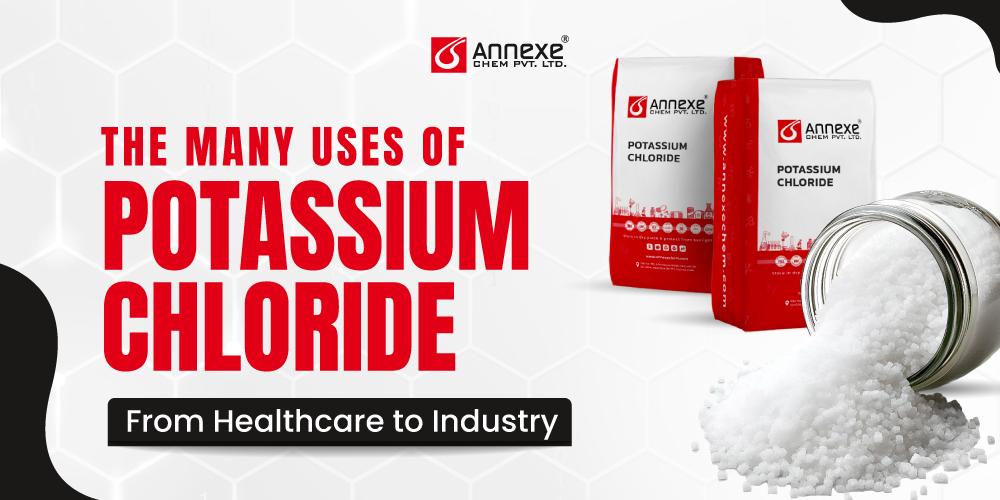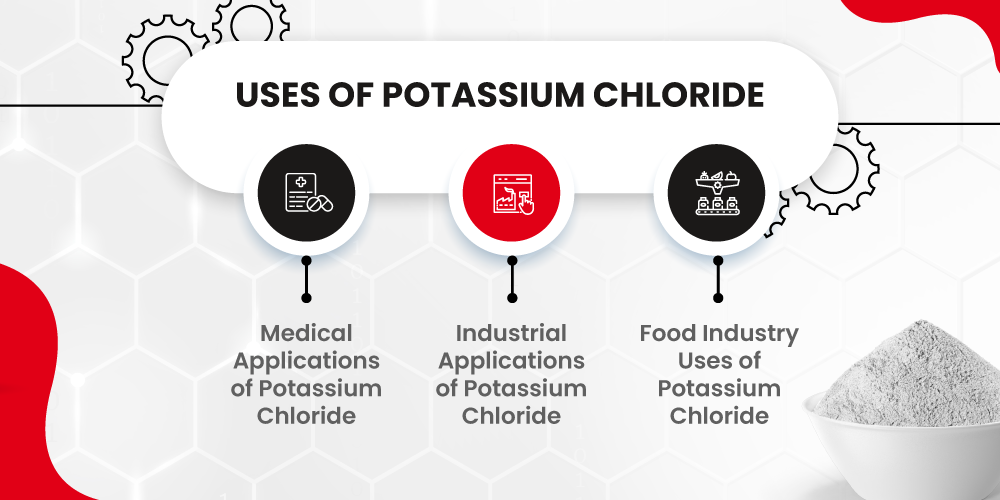The Many Uses of Potassium Chloride: From Healthcare to Industry - Annexe Chem Pvt Ltd
The Many Uses of Potassium Chloride: From Healthcare to Industry

- January 7, 2025
- By Akshita Patel
What if one simple compound could be critical in your health, improve crop yields, and even help soften your water? Meet potassium chloride, a versatile and essential mineral that’s more common—and beneficial—than you might think.
From keeping your heart beating steadily to boosting the world’s food supply, potassium chloride has found its way into nearly every aspect of our lives. But how much do you know about this unsung hero? In this blog, we’ll explore its fascinating properties, diverse applications, and the critical role it plays in everything from medicine to agriculture. Whether you’re curious about its health benefits or intrigued by its industrial uses, you’re in for an eye-opening journey!
What is Potassium Chloride?
Potassium chloride (KCl) is a naturally occurring compound composed of potassium (K) and chloride (Cl) ions. It is a type of salt with a crystalline structure and a white or colorless appearance. As a vital potassium source, it plays a significant role in various biological, agricultural, and industrial processes.
Chemical Composition and Basic Properties of Potassium Chloride
- Molecular Formula: KCl
- Molecular Weight: 74.55 g/mol
- Solubility: Highly soluble in water, making it an ideal candidate for applications requiring quick dissolution.
- Appearance: Typically appears as white crystals, flakes, or powder.
- Taste: Has a slightly bitter, salty flavor, making it a common sodium chloride substitute in low-sodium foods.
Its stability, non-toxic nature, and ease of handling make potassium chloride a preferred choice across industries.
Common Forms of Potassium Chloride
Depending on its intended use, potassium chloride is available in various forms, including:
- Granules: Used in agriculture as fertilizers to replenish soil potassium.
- Tablets: Commonly prescribed in medicine to treat potassium deficiencies (hypokalemia).
- Solutions: Found in intravenous (IV) formulations for quick absorption in medical treatments.
- Powders or Flakes: Utilized in industrial processes and water-softening systems.
Each form is tailored to maximize efficiency and effectiveness in its specific application, highlighting potassium chloride’s versatility as a compound.

Uses of Potassium Chloride
Potassium chloride is a versatile compound with applications spanning medicine, industry, and food production. Its ability to deliver potassium efficiently makes it invaluable across multiple sectors.
Medical Applications of Potassium Chloride
1. Role in Treating Hypokalemia: Hypokalemia, or potassium deficiency, can lead to muscle weakness, irregular heart rhythms, and fatigue. Potassium chloride, which replenishes potassium levels in the body, is a primary treatment for this condition.
- Mechanism: KCl restores the balance of electrolytes necessary for nerve transmission, muscle contraction, and heart function.
- Forms of Administration: Potassium chloride is available in tablets, capsules, or liquid solutions, providing flexibility based on patient needs.
2. Usage in IV Solutions and Oral Supplements: Potassium chloride is commonly included in intravenous (IV) fluids to treat severe cases of hypokalemia or when oral intake is not feasible. It is often combined with saline or dextrose in hospitals for critical care patients.
Prescribed for moderate potassium deficiencies, these are designed for gradual absorption, minimizing the risk of side effects. In both forms, the compound’s precise formulation ensures safety and efficacy in addressing potassium imbalances.
Industrial Applications of Potassium Chloride
1. Role in the Production of Various Chemicals: Potassium chloride serves as a raw material in the production of essential compounds:
- Potassium Hydroxide: Used in the manufacturing of soaps, detergents, and alkaline batteries.
- Potassium Carbonate: Employed in the glass industry and for pH control in agriculture.
2. Use in Water Softeners and De-Icing Agents: KCl is a common alternative to sodium chloride in water softening systems. It removes calcium and magnesium ions, reducing water hardness while being more environmentally friendly.
In colder regions, potassium chloride is used to prevent ice formation on roads and pavements. It is less corrosive than traditional salts, making it a safer option for infrastructure.
Food Industry Uses of Potassium Chloride
1. Usage as a Salt Substitute for Sodium Reduction: Potassium chloride is widely used as a healthier alternative to table salt (sodium chloride), particularly in low-sodium diets.
- Health Benefits: It helps reduce sodium intake, which can lower the risk of hypertension and cardiovascular diseases.
- Applications: Found in salt substitutes, seasoning blends, and processed foods aimed at health-conscious consumers.
2. Commonly Found in Low-Sodium Products: Food manufacturers incorporate KCl in products where sodium reduction is essential:
- Snacks: Chips, pretzels, and crackers.
- Ready-to-Eat Meals: Packaged soups, sauces, and frozen dinners.
- Beverages: Electrolyte drinks and health supplements.
Despite its slightly bitter taste, advances in flavor masking technologies have made potassium chloride a viable ingredient in enhancing food palatability without compromising health goals.
By catering to the medical, industrial, and food sectors, potassium chloride demonstrates its importance as a multifunctional compound with widespread applications.
Risks and Safety Considerations While Using Potassium Chloride
While potassium chloride is a versatile and beneficial compound, its improper use can pose health risks and safety concerns. Understanding these risks and adhering to safety guidelines ensures its effective and responsible application.
Potential Side Effects When Used as a Supplement: Potassium chloride supplements are widely used to address potassium deficiencies, but excessive intake or misuse can lead to side effects, including:
- Nausea and Vomiting: Common in cases where supplements irritate the stomach lining. Taking KCl with food or water can help minimize this risk.
- Diarrhea or Abdominal Discomfort: Particularly when high doses are consumed.
Hyperkalemia (Excess Potassium):
- Symptoms: Muscle weakness, irregular heartbeats, or, in severe cases, cardiac arrest.
- Causes: Often occurs due to overdosing or preexisting health conditions that impair potassium regulation.
Precautions for Individuals with Kidney Disease or Heart Conditions: Certain individuals need to exercise caution when using potassium chloride:
Kidney Disease: The kidneys play a vital role in regulating potassium levels. In individuals with compromised kidney function, potassium may accumulate in the blood, leading to hyperkalemia. KCl supplements should only be taken under strict medical supervision for such individuals.
Heart Conditions: Abnormal potassium levels, whether too high or too low, can disrupt heart rhythms, posing severe risks for those with cardiovascular diseases. Regular monitoring of blood potassium levels is essential to prevent complications. Consulting a healthcare professional before starting any potassium chloride regimen is crucial for these high-risk groups.
Safe Handling Practices for Industrial Use: In industrial and agricultural settings, potassium chloride is handled in bulk, requiring proper precautions to ensure safety:
- Wear gloves, safety goggles, and masks to prevent skin, eye, or respiratory irritation when handling KCl in its powdered or granulated form.
- Store KCl in a dry, well-ventilated area to prevent clumping or degradation.
- Ensure that it is kept away from incompatible substances like strong acids or oxidizers.
- Use controlled amounts of de-icing agents to minimize potential impacts on surroundings.
By understanding its risks and following safety recommendations, potassium chloride can be used effectively and responsibly across its diverse applications. Whether in medical, industrial, or agricultural settings, awareness and caution remain key to reaping its benefits without adverse effects.
Future of Potassium Chloride
As industries evolve, potassium chloride (KCl) continues to emerge as a critical compound with expanding applications. Innovations and sustainable practices are paving the way for its broader use in healthcare, agriculture, and beyond.
Innovations in Potassium Chloride Applications
Enhanced Medical Solutions: In healthcare, potassium chloride is being explored for:
- Precision Supplements: Advanced delivery mechanisms, such as extended-release tablets, provide better absorption and fewer side effects.
- Electrolyte Balancing Solutions: Innovations in IV formulations are enhancing patient care in critical health conditions.
Industrial Adaptations
- Eco-Friendly De-Icing Agents: Development of potassium chloride-based de-icing solutions that minimize environmental impact while maintaining effectiveness.
- New Chemical Processes: Utilizing KCl as a sustainable raw material in green chemistry practices to produce essential compounds.
Potential for Increased Usage in Sustainable Practices and Healthcare
Healthcare and Nutrition: The increasing prevalence of health conditions linked to dietary imbalances highlights the importance of potassium chloride:
- Combating Sodium Overload: KCl’s role as a salt substitute is expected to grow as consumers and industries prioritize heart-healthy diets.
- Personalized Medicine: Advances in pharmacology may see potassium chloride integrated into personalized treatments, addressing specific electrolyte imbalances more effectively.
Environmental Applications
- Carbon Sequestration: Research into potassium chloride’s role in carbon capture technologies is underway, offering a potential pathway to combat climate change.
- Soil Remediation: KCl is being studied for its ability to restore degraded soils, making it valuable in land reclamation efforts.
The future of potassium chloride lies in its adaptability and potential to meet the growing demands for sustainability, innovation, and improved quality of life. With ongoing research and technological advancements, this humble compound is poised to play an even greater role in shaping a healthier and more sustainable world.
Potassium chloride is more than just a compound; it’s a cornerstone of modern living, with applications that span healthcare, industry, and beyond. From enriching the soil to enhancing human health, its versatility and efficiency make it a vital resource.
As innovations continue to unlock new possibilities, potassium chloride’s role in sustainable practices, advanced medical solutions, and environmental preservation is only set to grow. By understanding its benefits and handling it responsibly, we can harness its full potential to improve lives and industries worldwide.
Whether you’re a professional in the medical or industrial sector, or simply someone curious about this essential compound, potassium chloride is a testament to how science and nature come together to drive progress. Stay informed and explore how this remarkable substance can make a difference in your world.

Akshita Patel
As an advocate for sustainability, Akshita is committed to driving positive change within the chemical industry. She actively seeks out environmentally friendly solutions and promotes the adoption of sustainable practices. Akshita believes that a balance between economic growth and ecological responsibility is crucial for the industry's long-term success. She is dedicated to finding innovative ways to minimize environmental impact while maximizing efficiency and profitability.
Related Blogs

- August 20, 2024
- By Akshita Patel
Exploring the Applications and Benefits of.
When it comes to versatile chemical compounds, Tri-Sodium Phosphate Dodecahydrate (TSP Dodecahydrate) stands out as a.

- May 12, 2025
- By Akshita Patel
Why Citric Acid Anhydrous is a.
Ever wondered what gives your favorite fizzy drink its tangy kick or keeps your skincare products.



